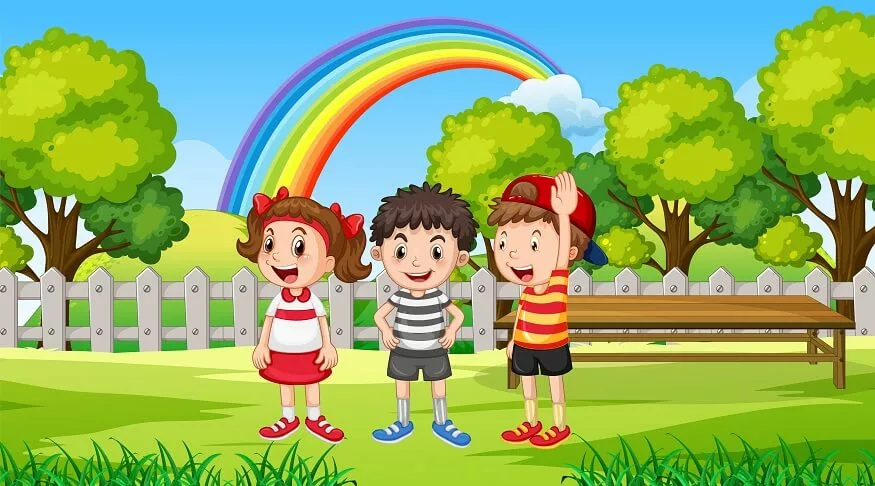In the vibrant world of kindergarten, building friendships is a crucial aspect of a child’s social and emotional development. The connections made during these early years lay the foundation for a lifetime of interpersonal skills and shared experiences. Let’s explore the strategies that can help kindergarteners make new friends and understand the significance of fostering friendships in childhood.
1. Make New Friends: The Playground Quest
The playground becomes a magical domain where the journey of friendship unfolds. Encouraging children to make new friends involves creating an inclusive environment. Teachers and caregivers play a pivotal role in arranging activities that promote collaboration and teamwork. Structured play sessions and group activities allow kindergarteners to interact, share, and forge connections naturally.
2. Friendship for Kindergarten: The Art of Sharing
In the kindergarten universe, sharing becomes an essential skill in the friendship toolkit. Teachers can introduce activities that emphasise the joy of sharing, such as collaborative art projects or group storytelling. These activities not only enhance the sense of community but also instil the value of generosity and cooperation.
3. Strategies for Kindergarten Friendship: Inclusive Play
Inclusive play is a powerful strategy for kindergarten friendship building. Teachers can organise games and activities that encourage every child to participate, ensuring that no one feels left out. By emphasising teamwork and celebrating individual strengths, these activities create a sense of belonging and unity among kindergarteners.
4. Make New Friends: Buddy Systems
Implementing a buddy system is an effective way to make new friends in kindergarten. Pairing children to work on projects, share experiences, or navigate daily activities fosters a sense of companionship. This system not only encourages social interaction but also provides emotional support, helping children feel more secure and connected within the kindergarten community.
5. Importance of Childhood Friendships: Conflict Resolution Skills
Friendships come with their fair share of conflicts, even in kindergarten. Teaching children how to navigate disagreements, express themselves respectfully, and find common ground is a vital aspect of friendship building. Kindergarten becomes a classroom for conflict resolution, where children learn to communicate effectively and maintain positive relationships and also learn the importance of childhood friendships.
6. Friendship for Kindergarten: Storytelling Sessions
Storytelling sessions offer an imaginative platform for kindergarten friendship-building. Teachers can choose narratives that emphasise the value of friendship, teamwork, and kindness. These stories not only captivate young minds but also provide subtle lessons about the beauty of diverse friendships and the joy of sharing adventures with others.
Also Read: 10 Activities to Celebrate International Friendship Day
7. Strategies for Kindergarten Friendship: Role Modelling
Educators and parents serve as primary role models for kindergarteners. Demonstrating positive social behaviours, including kindness, empathy, and inclusivity, sets the tone for the kindergarten community. Children observe and emulate these behaviours, creating a culture where friendship and cooperation thrive.
8. Make New Friends: Celebrate Diversity
Kindergarten is a melting pot of diverse backgrounds, and celebrating this diversity contributes to friendships. Teachers can organise activities that explore different cultures, traditions, and perspectives. By appreciating diversity, kindergarteners learn to embrace individual uniqueness, fostering an inclusive and harmonious environment.
9. Importance of Childhood Friendships: Lifelong Benefits
The importance of friendships in childhood extends beyond the kindergarten years. Research indicates that positive social interactions during early childhood contribute to better mental health, improved academic performance, and enhanced social skills in the long run. Nurturing friendships in kindergarten lays the groundwork for a supportive and resilient social network throughout life.
10. Strategies for Kindergarten Friendship: Group Projects and Collaborative Learning
Engaging kindergarteners in group projects and collaborative learning activities is an excellent strategy for fostering friendships in kindergarten. Teachers can organise projects that require teamwork, where children collectively contribute ideas and efforts to achieve a common goal. This not only promotes social interaction but also allows each child to appreciate the unique strengths and talents of their peers.
Also Read: 20 Fun Birds Activities for Kindergarten Children
11. Make New Friends: Friendship Corners and Buddy Benches
Introducing designated friendship corners or buddy benches in the kindergarten environment encourages children to make new friends organically. These designated spaces provide a safe and inviting area for children seeking companionship. The concept is simple: a child who feels lonely or wishes to make new friends can sit on the buddy bench, signalling to others that they are open to friendship. It’s a subtle yet effective way to promote inclusivity and ensure that no child feels isolated during playtime.
12. Friendship for Kindergarten: Themed Playdays
Organising themed playdays centred around friendship and collaboration injects an extra dose of fun into the kindergarten experience. Teachers can plan activities, games, and crafts with friendship themes, encouraging kindergarteners to bond over shared interests. Themed playdays create a positive atmosphere where children associate the joy of play with building connections, making the kindergarten setting even more conducive to friendship for kindergarten development.
13. Make New Friends: Positive Reinforcement
Implementing positive reinforcement strategies reinforces the importance of friendships in childhood and exhibits positive social behaviours. Teachers can acknowledge and celebrate instances of kindness, sharing, and collaboration, creating a culture where these actions are valued and encouraged. Positive reinforcement not only motivates kindergarteners to continue displaying friendly behaviours but also contributes to the overall positive atmosphere of the kindergarten classroom.
Also Read: What Does Kindergarten Readiness Mean
14. Friendship for Kindergarten: Pen Pal Programs
Introducing pen pal programs between kindergarteners from different classes or even different schools broadens the scope of friendship-building. Children can exchange letters, drawings, or small gifts, fostering connections beyond their immediate surroundings. Pen pal programs not only promote friendship but also introduce the concept of diversity and interconnectedness, expanding the horizons of the kindergarten experience.
15. Strategies for Kindergarten Friendship: Outdoor Adventure Days
Taking learning beyond the classroom, outdoor adventure days provide a dynamic platform for kindergarteners to make new friends. Field trips, nature walks, and outdoor exploration activities not only stimulate curiosity but also create shared experiences. These adventures offer ample opportunities for children to collaborate, communicate, and form bonds with their peers in an environment that sparks curiosity and excitement.
16. Friendship for Kindergarten: Pen Pal Programs
Introducing pen pal programs between kindergarteners from different classes or even different schools broadens the scope of friendship-building. Children can exchange letters, drawings, or small gifts, fostering connections beyond their immediate surroundings. Pen pal programs not only promote friendship but also introduce the concept of diversity and interconnectedness, expanding the horizons of the kindergarten experience.
Also Read: Developing Friendships and Cooperation in Preschoolers
The strategies for kindergarten friendship outlined above collectively contribute to the creation of a supportive and inclusive environment where children can make new friends and develop essential social and emotional skills. The importance of childhood friendships goes beyond the immediate kindergarten setting, shaping the way children approach relationships throughout their lives. By incorporating these diverse strategies, educators and parents can collaboratively nurture a culture of friendship in kindergarten, ensuring that each child experiences the joy and enrichment that meaningful connections bring to their early years. Kindergarten becomes a space for academic learning and a vibrant community where friendships flourish, laying the groundwork for a lifetime of positive social interactions.
Starting on a transformative educational journey with EuroSchool, where kindergarten is not just about learning ABCs but also fostering lasting friendships. Our innovative approach integrates strategies for building strong social bonds, ensuring that each child experiences the joy of making new friends in a supportive and inclusive environment. At EuroSchool, we believe that friendships formed during kindergarten lay the foundation for a lifetime of positive social interactions, enriching the educational experience. Join us in cultivating not just academic excellence but also a vibrant community where every child thrives socially and emotionally. EuroSchool – Shaping Futures, Nurturing Friendships.










